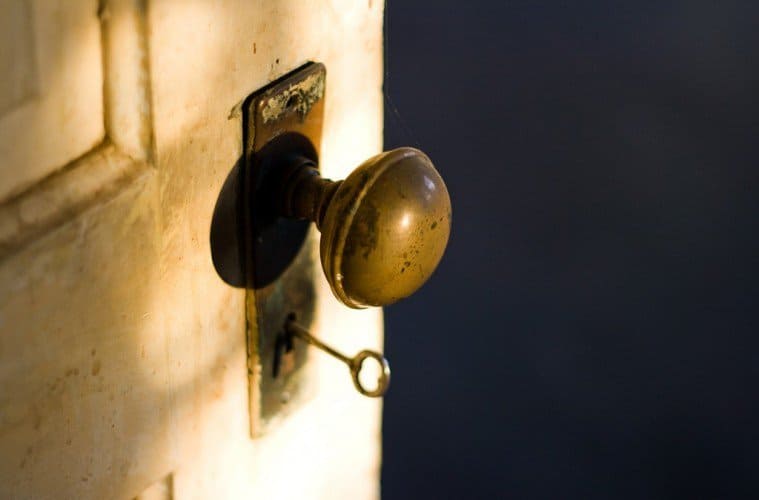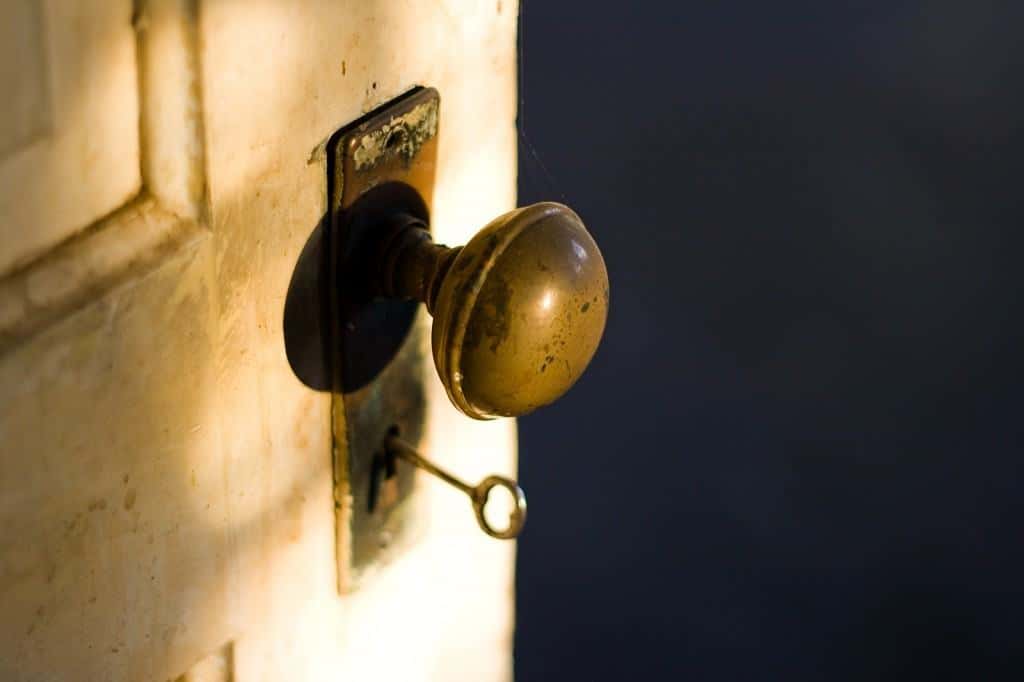~Observations of An Accidental Catholic
How welcoming is your church? Are there Ushers at the door to greet and direct your parishioners? Is the Pastor there ready to receive the parishioners into the Church? Are there Holy Water founts inside the doors to the Church? Are there pews or chairs in which your people may sit during the Mass? Are candles burning to illuminate the Sanctuary?
I am confident that the staff and Pastor of your church have made sure that these things are present so that the people will feel welcome and want to be there. But, have you ever thought about what happens to this place of worship and sanctuary when darkness settles its veil upon it? One woman did. Here is her story.
Our Father which art in Heaven. . .tonight, in the heart of a city called Milwaukee, I felt despair, loneliness, heart sick. I walked from my motel to the corner and saw your house across the street. The hunger in my soul for the place and solitude of your altar quickened inside me; I crossed the street, climbed the stairs and reached hungrily for the handle of the glass door through which I could see the quiet, loneliness of a simple altar of prayer.
The pain that swept through me pushed sobs of despair from my throat as I found no admittance to your offer of peace to my troubled soul. Down this street, many doors stood open—offering alcohol to deaden pain, companionship of others lost, seeking solace in drink and degradation in one shape or another. Yet these I did not want, knowing their offer of respite was but a fleeting thing of no value. I shook the glass door in a fury of tears, turned in despair as traffic poured down Wisconsin Avenue, rounded the corner down the side street trying to control my sobs, and even as I walked I could see the plot of ground for cars allotted to those who come to this house, supposedly Yours. Yes, even this was chained and padlocked.
Father! Father! Why hast thou forsaken us! But, this is not true—why have we forsaken You! Why is the place of Your House denied us? Is it no wonder we turn to alcohol or drugs when those who teach and preach lock Your doors to he who seeks? Their excuse—vandalism! Did not the Son show his fury at the exploiters of the place of worship? Is this what Your House has become—merely a show place with no real meaning? Where, Oh God, can we find You? Must we ask for a metal key to gain admittance?
This, then, is Hell on Earth.
My mother wrote this story down in a spiral notebook sometime in the 1970s. I recently found it going through her papers after she had passed away. Inside the box with the papers were three keys; one to a door, and the other two identical keys to a set of luggage. The irony struck me as I read her story with tears running down my face. How long had these keys been hidden away? Was there a connection? In reflecting on my mother’s life, I think there is. My mother was a broken spirit by the time she was in her mid 30s. Her husband, my father, left the family when my brother was only 5 or 6 years old, leaving her to raise her three children and his two teen-aged daughters from his first marriage. Her own mother, my Grandmother, was excommunicated by the Church in 1921 because she chose to divorce her savagely abusive husband who not only forced her to give up her two small boys, but, he made sure that she never saw them again. She put her life back together, marrying again and having three more children, my mother being her youngest. My mother’s older siblings received all the Sacraments of the Church available to them, but, her parents had moved the family out to the country by the time my mother came along in 1934. No Church was near enough so she was not given the chance to receive the Sacraments, let alone go to Church. My mother grew up without any formal religion, but, she was an avid reader. She read the Bible, God’s Word, and knew its purpose and stories well. She would impart the scriptures to us, her own three children, in various and sundry ways. She, having had this as her moral code, taught us the Ten Commandments, The Lord’s Prayer, and the most important one to her, The Golden Rule. This was the extent of my religious upbringing. And, it was enough, for a while.
When I met my husband, a fallen away Catholic himself, we would attend his younger siblings’ First Communion and Confirmation ceremonies. I, who was nothing let alone just not Catholic, was summarily told to stay in my seat when the rest of the family got up to get in line. Could there have been a better, more charitable way of saying the same thing? I had no idea what was happening, and no one took the time to tell me what was happening. I felt like an outsider—the unwelcome guest who showed up to Thanksgiving dinner where no one wanted to tell me how I could be a part of the meal. No key was offered.
Five years later, I decided that I did not want to be an outsider any longer. I sought out the RCIA Director of the local parish. In 1992, I received the Sacraments of Baptism, Communion, and Confirmation at Easter. I had become a full member in the Roman Catholic Church. I thought I finally had been accepted, even given a key perhaps. But, Bryan and I did not attend Mass often. Bryan was “mad at God” because his beloved grandmother died and he thought God took her from him. He did not hold a key. His grandmother who raised Bryan had been a devout daily communicant who walked to Church. She had the key. Bryan did not.
What was different? What was missing? While the checklist before a Liturgy may include lighting the candles and making sure there is water in the little cups by the door, and may even have a person or two ready to shake a hand in welcome, what is the key?
Could it be that, like my mother who was hungry for solace and sanctuary and was denied it, or like me who was simply told to stay put, that there are people among us who are invisible because of our own blindness? My mother never recovered from her denied entry, and never sought solace in a place of worship again. Instead, she lived her life in a prison cell of depression, with walls of her own devising, because she didn’t have the key and no one reached out with one for her during her long dark night.
Could it be that locking the doors to the sanctuary is a metaphor for how we treat our fellow human beings? Could it be that living our lives closed off and secure in our own pain is what prevents us from loving our neighbor?
I think about that key. What is the key? Who really owns the key? Why do we give away the power to have the key to others? Is the key to the door really the key to our own heart? Why do we not let love in, but instead lock it out? Could it be that those who hold the key do not know how it works either? Could it be that not taking the time to share your own key denies another the key?
I was one of the lucky ones. We placed our three-year old son in a pre-school that taught him his letters, numbers, and all about Jesus and His love. It was my son who, at three years old, asked me to tell him more about Jesus. I couldn’t answer his questions, so I was determined that I would learn so that I could answer his desire to know more about Jesus. My son was my key. I started to take my son to Mass. It was our special time. Eventually, Bryan started to come with us. Now, we all hold a key. I was hungry and I was finally welcomed at the table of the Lord.
How would things have been different if my mother, who had once cried out in despair and had been left to turn into bitter ash, had instead found an open door? My mother had never been baptized. It was while she was in the hospital seriously ill that I suggested that she be baptized. It took some persuading, but, she did finally accept the idea. My cousin, a Seventh-Day Adventist Pastor, performed her baptism in the hospital. Six months later, Mom died. At her memorial ceremony, as we were burying the urn of her ashes in the ground at the foot of her mother’s gravesite, Tony shared with us that my mother’s baptism was the first one he witnessed where the person receiving the cleansing waters of baptism ever cried.
I pray that my mother finally holds her key and that the door to the Sanctuary is now wide open. But, what of the Church left here on Earth. What if the Church, with its iconic Crucifix raised up for all to see, the Crucifix with its arms spread wide, does not know what its message truly means? That loving our neighbor means we must open our hearts to the pain of living a life with the key to the Kingdom, not by keeping it to ourselves, but by daily giving it away. Are we not called to know and live this simple scripture from Matthew 16:19, where Christ is addressing Peter, and perhaps to us also, in a different way, “I will give you the keys of the kingdom of heaven; and whatever you bind on earth shall have been bound in heaven, and whatever you loose on earth shall have been loosed in heaven.”



